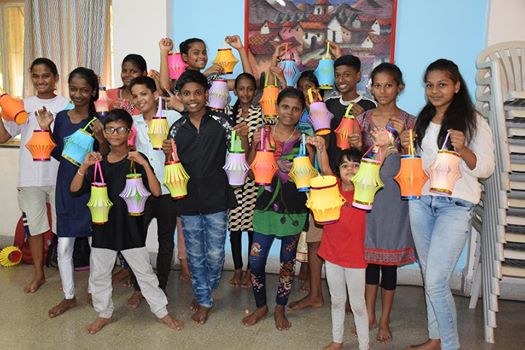
7 Nov 2018 | Focolare Worldwide
 In India, in these days is the Festival of Light, the most important celebration of the year: Diwali. It commerates the victorious return of Rama, the manifestation of the Divinity Vishnu, in his capital, Ayodhya, after 14 years of exile and wandering. Therefore, today is a sybolic celebration of the return of the Light to its original home: the victory of good over evil. It is customary to light lamps and candles during the feast, which are traditionally called diya. In many areas of India there are light shows. Project Udisha in Mubai has invited everyone to “light a lamp on the front porch to remind us of the victory of Love, which is in our hearts and which we want to make grwo towards all, beginning with our own family.” See the Facebook page UDISHA PROGETTO MUMBAI INDIA
In India, in these days is the Festival of Light, the most important celebration of the year: Diwali. It commerates the victorious return of Rama, the manifestation of the Divinity Vishnu, in his capital, Ayodhya, after 14 years of exile and wandering. Therefore, today is a sybolic celebration of the return of the Light to its original home: the victory of good over evil. It is customary to light lamps and candles during the feast, which are traditionally called diya. In many areas of India there are light shows. Project Udisha in Mubai has invited everyone to “light a lamp on the front porch to remind us of the victory of Love, which is in our hearts and which we want to make grwo towards all, beginning with our own family.” See the Facebook page UDISHA PROGETTO MUMBAI INDIA
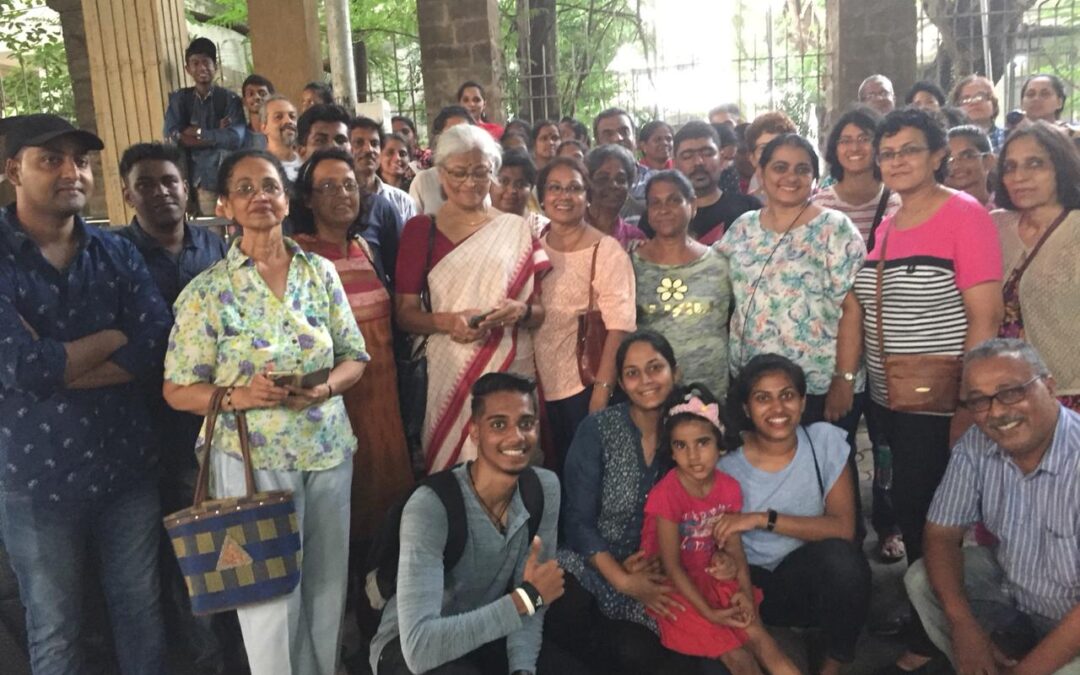
6 Nov 2018 | Focolare Worldwide
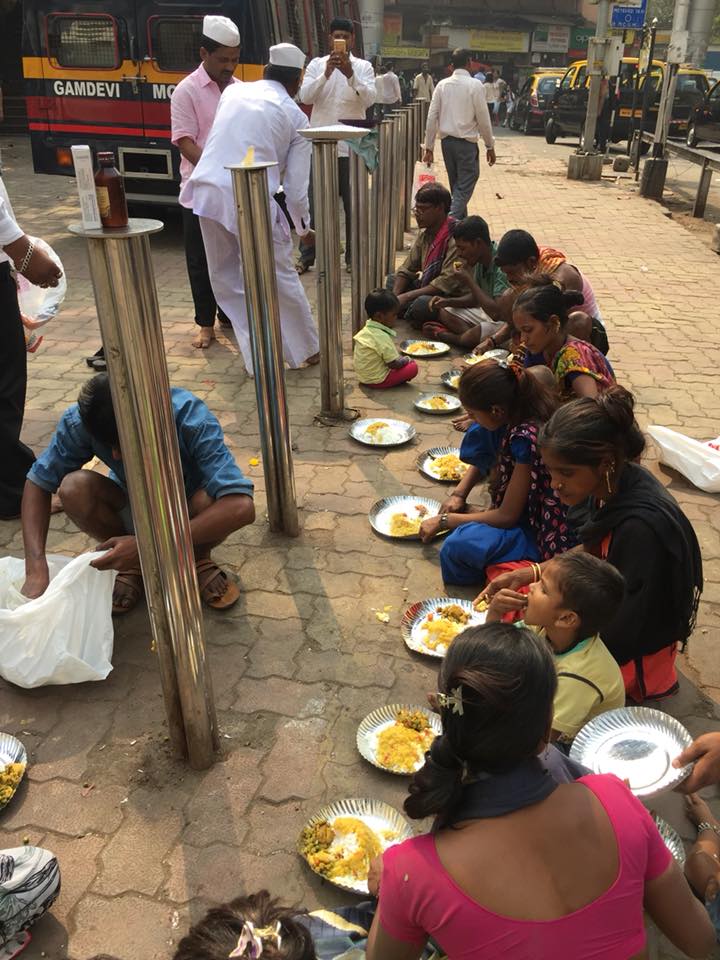 With one of the fastest growing economies, India is a country which is racing toward constant improvement in life expectancy, literacy rates and health conditions. However, of the 1.2 billion inhabitants of the country, the conditions of those living in the poorest regions are still difficult. Despite its status as an economic power, mortal malnutrition persists. Every evening in India, 200 million people try to fall asleep despite the gnawing hunger. And every day, 3,000 children die of hunger. In Mumbai, where thousands of people go for cancer treatments, Sunny of the Focolare community, wrote: “During the treatments, the families sleep on the road or around the hospital, in the lack of all necessities.” This is an alarming situation of poverty, especially if compared with the data related to the growing waste of perfectly whole foodstuffs, thrown away at the end of wedding banquets, rites, and family parties. The country is one of the world’s main producers of foodstuff, but is likewise one in which a good part of these goods are wasted. Among the causes are also the shortage of transport and warehousing systems especially the “cold chain” system: according to estimates in 2017 of the Indian Ministry of Agriculture, the value of the losses connected to foodstuff wastes (not only in terms of farming goods and foodstuffs, but also in the use of water and energy) could range between 8 and 15 billion dollars yearly.
With one of the fastest growing economies, India is a country which is racing toward constant improvement in life expectancy, literacy rates and health conditions. However, of the 1.2 billion inhabitants of the country, the conditions of those living in the poorest regions are still difficult. Despite its status as an economic power, mortal malnutrition persists. Every evening in India, 200 million people try to fall asleep despite the gnawing hunger. And every day, 3,000 children die of hunger. In Mumbai, where thousands of people go for cancer treatments, Sunny of the Focolare community, wrote: “During the treatments, the families sleep on the road or around the hospital, in the lack of all necessities.” This is an alarming situation of poverty, especially if compared with the data related to the growing waste of perfectly whole foodstuffs, thrown away at the end of wedding banquets, rites, and family parties. The country is one of the world’s main producers of foodstuff, but is likewise one in which a good part of these goods are wasted. Among the causes are also the shortage of transport and warehousing systems especially the “cold chain” system: according to estimates in 2017 of the Indian Ministry of Agriculture, the value of the losses connected to foodstuff wastes (not only in terms of farming goods and foodstuffs, but also in the use of water and energy) could range between 8 and 15 billion dollars yearly. 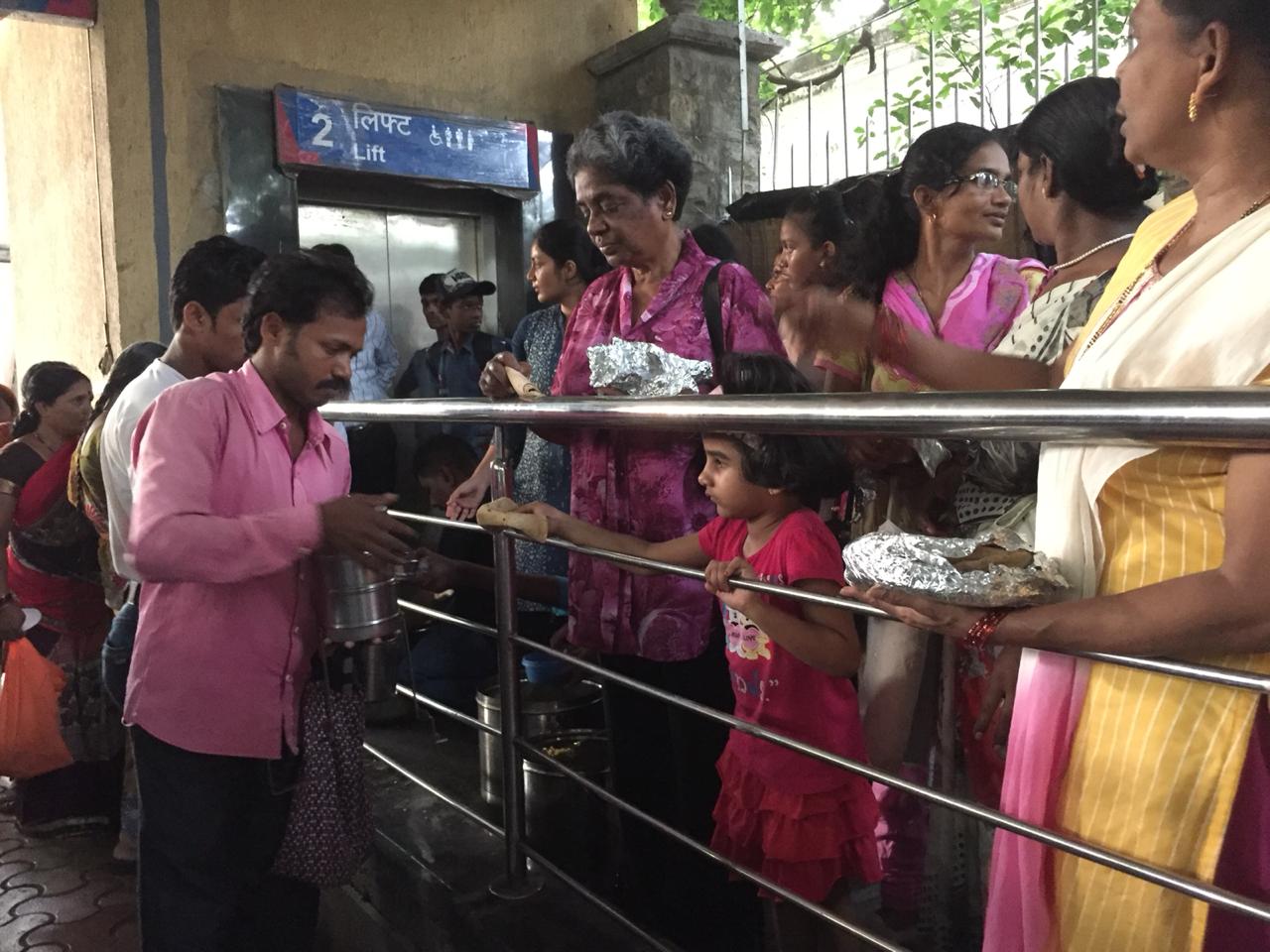 From 2017 onward the nonprofit RotiBank has been working to gather food rejects or those freshly prepared from food companies, like hotels or cafeterias, and involving them in a safe way in the slums or for homeless people. “Roti” is a typical, round Indian bread, from a dough of whole-bran flour and water, baked also on stones. After having received a van as a gift, RotiBank is now working to increase the number of vehicles and staff. Many of the people benefited are children or labourers who do not get a minimum salary to be able to survive. The non-profit initiative avails of a chain of volunteers who, after their normal work hours, participate in the collection and distribution of leftover food. “It is essential – the presentation of the initiative says – to redistribute the leftovers, and perfectly edible food intended for the dumpsite, to people who are really in need.”
From 2017 onward the nonprofit RotiBank has been working to gather food rejects or those freshly prepared from food companies, like hotels or cafeterias, and involving them in a safe way in the slums or for homeless people. “Roti” is a typical, round Indian bread, from a dough of whole-bran flour and water, baked also on stones. After having received a van as a gift, RotiBank is now working to increase the number of vehicles and staff. Many of the people benefited are children or labourers who do not get a minimum salary to be able to survive. The non-profit initiative avails of a chain of volunteers who, after their normal work hours, participate in the collection and distribution of leftover food. “It is essential – the presentation of the initiative says – to redistribute the leftovers, and perfectly edible food intended for the dumpsite, to people who are really in need.” 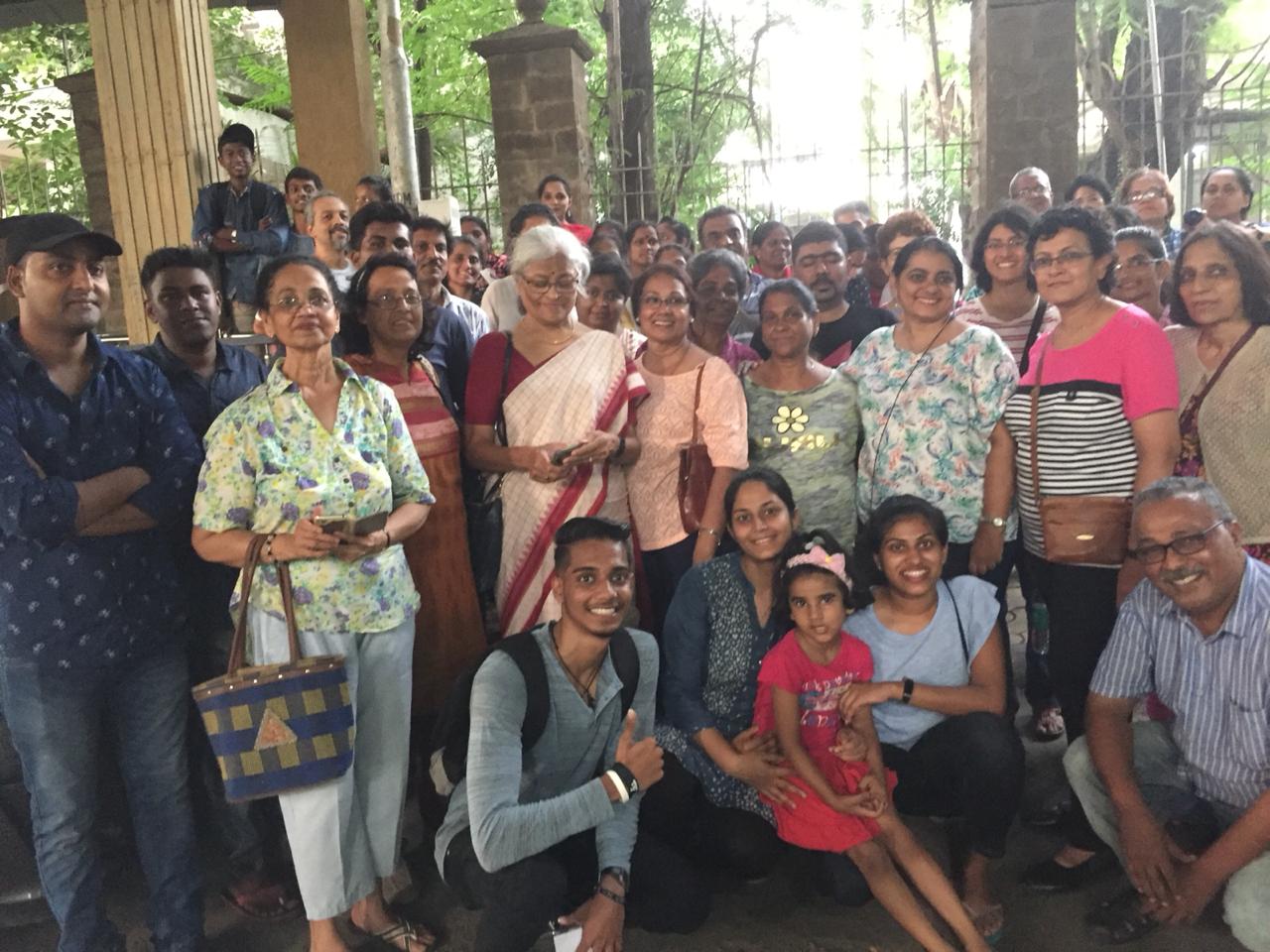 Sunny explained: “We decided to start our battle with an awareness afternoon in support of this non-profit organisation. About 45 members of the Mumbai Focolare community placed themselves at disposal to serve the meals. It was an occasion for us to verify our own shopping methods, and realise that every day we can put something aside to allow these families to have their lunch. It was moving to see how many people were waiting to receive a bit of food. One of the participants said: “I’m so happy to be part of this experience. I shall never forget the expression on the faces of the people queueing up.” Perhaps all of us should see it. Chiara Favotti
Sunny explained: “We decided to start our battle with an awareness afternoon in support of this non-profit organisation. About 45 members of the Mumbai Focolare community placed themselves at disposal to serve the meals. It was an occasion for us to verify our own shopping methods, and realise that every day we can put something aside to allow these families to have their lunch. It was moving to see how many people were waiting to receive a bit of food. One of the participants said: “I’m so happy to be part of this experience. I shall never forget the expression on the faces of the people queueing up.” Perhaps all of us should see it. Chiara Favotti
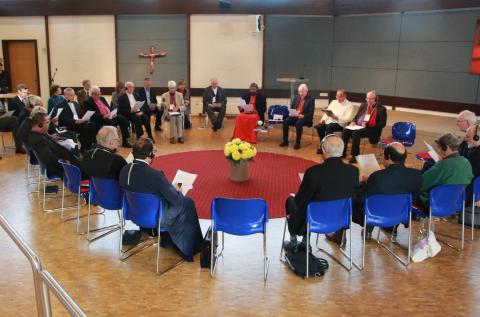
5 Nov 2018 | Focolare Worldwide
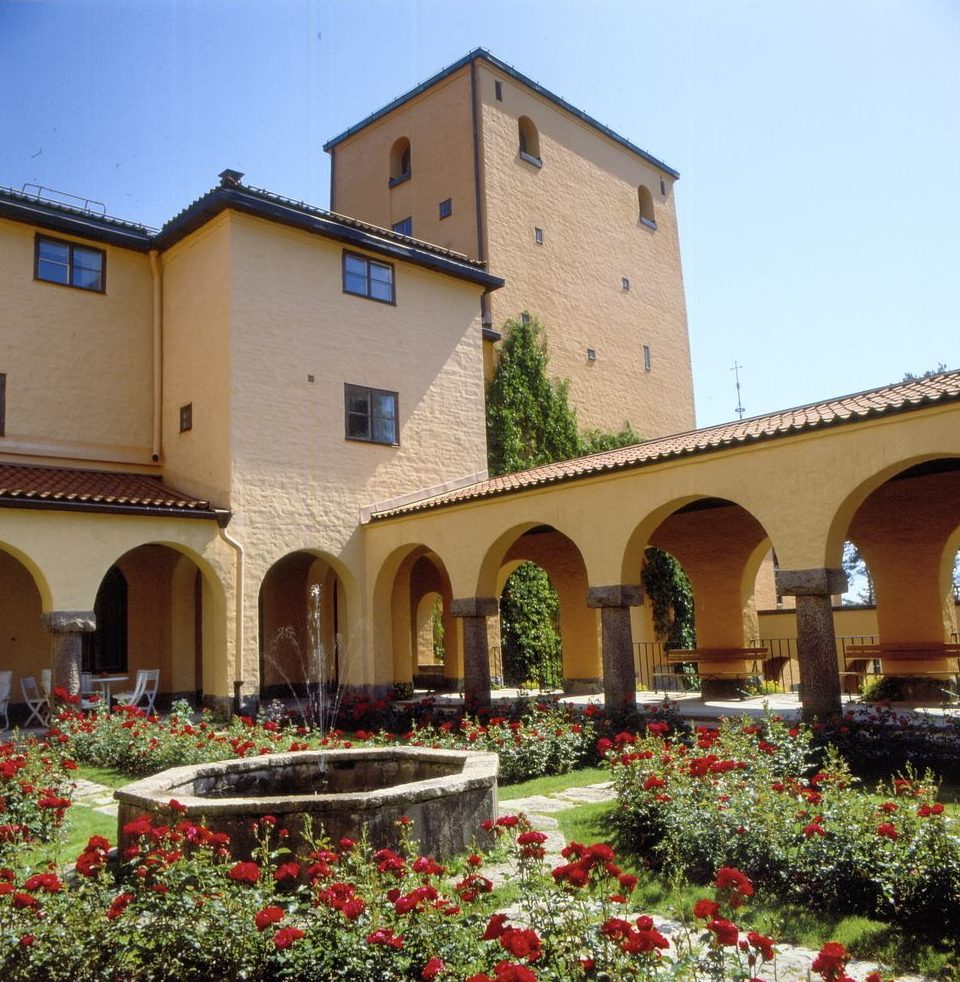 The 40 bishops, who are friends of the Focolari and come from various Christian Churches, have decided to meet in Sweden because of its profound significance in the ecumenial journey. The meeting will be taking place two years after the Lund event, one that has given a new impetus to ecumenical dialogue. In the joint declaration signed by Pope Francis and Bishop Munib Youman, who was then President of the Lutheran World Federation, one reads: “We pledge to witness together to God’s merciful grace, made visible in the crucified and risen Christ. Aware that the way we relate to one another shapes our witness to the Gospel, we commit ourselves to further growth in communion rooted in Baptism, as we seek to remove the remaining obstacles that hinder us from attaining full unity. Christ desires that we be one, so that the world may believe (cf. John 17:21)”. The periodic meetings of these bishops, who also wish to go deeper into the spirituality of unity that stemmed from Chiara Lubich’s charism, aim towards a communion that is a witness to the Gospel. They were held in Jerusalem, Constantinople (Istanbul), London, Augsburg, Katowice and other cities of significant importance in the ecumenical journey.
The 40 bishops, who are friends of the Focolari and come from various Christian Churches, have decided to meet in Sweden because of its profound significance in the ecumenial journey. The meeting will be taking place two years after the Lund event, one that has given a new impetus to ecumenical dialogue. In the joint declaration signed by Pope Francis and Bishop Munib Youman, who was then President of the Lutheran World Federation, one reads: “We pledge to witness together to God’s merciful grace, made visible in the crucified and risen Christ. Aware that the way we relate to one another shapes our witness to the Gospel, we commit ourselves to further growth in communion rooted in Baptism, as we seek to remove the remaining obstacles that hinder us from attaining full unity. Christ desires that we be one, so that the world may believe (cf. John 17:21)”. The periodic meetings of these bishops, who also wish to go deeper into the spirituality of unity that stemmed from Chiara Lubich’s charism, aim towards a communion that is a witness to the Gospel. They were held in Jerusalem, Constantinople (Istanbul), London, Augsburg, Katowice and other cities of significant importance in the ecumenical journey.  The participants attending this 37th meeting belong to 12 Christian Churches and come from 18 different countries; they will reflect on: “The Spirit’s breath of life and today’s world”. Maria Voce, president of the Focolare Movement will also be present and she will speak about “The Holy Spirit, Soul of the Church in the experience and thought of Chiara Lubich”. Other related themes will range: from the ecumenical challenge in different geographical regions to the meaning of reconciliation in today’s culture; from the Church’s renewal to synodality. Space will also be dedicated to the joint commemoration of the Reformation (2017) and its meaning for the Churches today. Stefania Tanesini
The participants attending this 37th meeting belong to 12 Christian Churches and come from 18 different countries; they will reflect on: “The Spirit’s breath of life and today’s world”. Maria Voce, president of the Focolare Movement will also be present and she will speak about “The Holy Spirit, Soul of the Church in the experience and thought of Chiara Lubich”. Other related themes will range: from the ecumenical challenge in different geographical regions to the meaning of reconciliation in today’s culture; from the Church’s renewal to synodality. Space will also be dedicated to the joint commemoration of the Reformation (2017) and its meaning for the Churches today. Stefania Tanesini
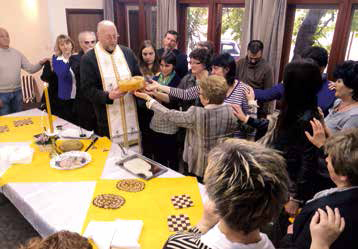
29 Oct 2018 | Focolare Worldwide
 I am an internist and belong to the Russian-Orthodox church. As a person and believer, I was educated by my parish priest and the spirituality of Chiara Lubich. I was still very young when, through contact with the focolarine in Moscow, I felt the call to follow God in a radical way and I have been living in the focolare house of Belgrade (Serbia) for 7 years now. There is a particular and unique tradition in Serbia: the Slava feast, which the families celebrate on the day of that family’s patron saint; for the Serbs, the Slava is as ancient as Christianity itself. No Christian nation has this type of celebration, except the Orthodox Serbs. For a Serbian family the Slava comes after Easter and Christmas in terms of importance. The Orthodox-Christian missionaries who converted the Serbs to the Holy Orthodox faith, also Christianised their customs. Upon becoming Orthodox Christians, the Serbs accept the saint or saints of the day on which they are baptized. In Serbian culture, the Slava has always been a unique element throughout the history of the Serbian Orthodox people. Since the Serbs find themselves in a geographic region between the East and the West, and between different cultures, the Slava has become a feast identified with one’s own name and existence. It is celebrated by cities and even by military units also through cultural and social organisations. On that day, relatives, friends and acquaintances get together. The house is open to all. Our focolare is composed of Catholic focolarine from various countries and by me. For some time now we have felt the desire to make this beautiful tradition of the Serbian people our very own, and celebrate it together with our brothers and sisters. In the ecumenical spirit of the Focolare, our monk-friend, Fr. Djordje, helped us to choose our patron saint, and he suggested celebrating the holy “mironosice” women (the “women who went to the sepulchre with the herbs and spices”), and to whom the Orthodox Church dedicate an entire week starting from the second Sunday after Easter. So we have celebrated the Slava in the focolare for 4 years now. Many of our Orthodox friends were enthusiastic about our decision and helped us to prepare the things needed for the feast. Every year, for the Sunday of the holy women at the sepulchre, we welcome our friends of various churches, among whom are also our next-door neighbours, and some colleague, labourer or doctor. The highlight – the rite of slicing the Slava bread – is celebrated by our friend, Fr. Djordje, before the icon of the women at the sepulchre. We start with a devout prayer, accompanied by songs, and then, very moved and hand in hand, we pray according to the Slava feast tradition. Giving us the first benediction, Fr. Djordje pointed to the holy women of the sepulchre as models and protectors of the focolare, encouraging us to follow the example of the women, follow Jesus and become “like the salt that transforms society and its surroundings.” The rite is followed by the agape, with various culinary specialties in an atmosphere of joy and communion, as in a family. One of our acquaintances told us that he considered this step “a real enculturation that appreciates and makes the other’s culture one’s own: true Christianity.” Source: NU, new humanity, no. 231, p. 75.
I am an internist and belong to the Russian-Orthodox church. As a person and believer, I was educated by my parish priest and the spirituality of Chiara Lubich. I was still very young when, through contact with the focolarine in Moscow, I felt the call to follow God in a radical way and I have been living in the focolare house of Belgrade (Serbia) for 7 years now. There is a particular and unique tradition in Serbia: the Slava feast, which the families celebrate on the day of that family’s patron saint; for the Serbs, the Slava is as ancient as Christianity itself. No Christian nation has this type of celebration, except the Orthodox Serbs. For a Serbian family the Slava comes after Easter and Christmas in terms of importance. The Orthodox-Christian missionaries who converted the Serbs to the Holy Orthodox faith, also Christianised their customs. Upon becoming Orthodox Christians, the Serbs accept the saint or saints of the day on which they are baptized. In Serbian culture, the Slava has always been a unique element throughout the history of the Serbian Orthodox people. Since the Serbs find themselves in a geographic region between the East and the West, and between different cultures, the Slava has become a feast identified with one’s own name and existence. It is celebrated by cities and even by military units also through cultural and social organisations. On that day, relatives, friends and acquaintances get together. The house is open to all. Our focolare is composed of Catholic focolarine from various countries and by me. For some time now we have felt the desire to make this beautiful tradition of the Serbian people our very own, and celebrate it together with our brothers and sisters. In the ecumenical spirit of the Focolare, our monk-friend, Fr. Djordje, helped us to choose our patron saint, and he suggested celebrating the holy “mironosice” women (the “women who went to the sepulchre with the herbs and spices”), and to whom the Orthodox Church dedicate an entire week starting from the second Sunday after Easter. So we have celebrated the Slava in the focolare for 4 years now. Many of our Orthodox friends were enthusiastic about our decision and helped us to prepare the things needed for the feast. Every year, for the Sunday of the holy women at the sepulchre, we welcome our friends of various churches, among whom are also our next-door neighbours, and some colleague, labourer or doctor. The highlight – the rite of slicing the Slava bread – is celebrated by our friend, Fr. Djordje, before the icon of the women at the sepulchre. We start with a devout prayer, accompanied by songs, and then, very moved and hand in hand, we pray according to the Slava feast tradition. Giving us the first benediction, Fr. Djordje pointed to the holy women of the sepulchre as models and protectors of the focolare, encouraging us to follow the example of the women, follow Jesus and become “like the salt that transforms society and its surroundings.” The rite is followed by the agape, with various culinary specialties in an atmosphere of joy and communion, as in a family. One of our acquaintances told us that he considered this step “a real enculturation that appreciates and makes the other’s culture one’s own: true Christianity.” Source: NU, new humanity, no. 231, p. 75.
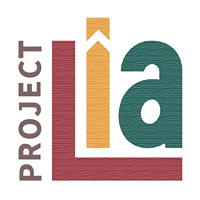
25 Oct 2018 | Focolare Worldwide
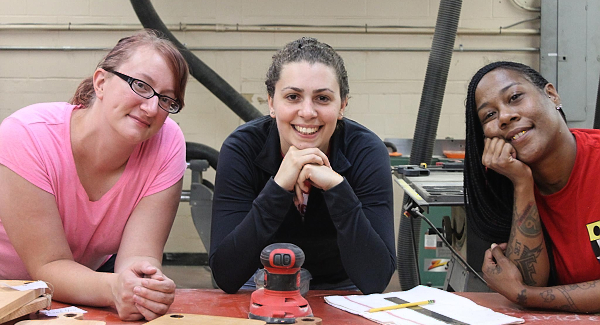 “During the summer months I attended the business programme of the network of businesses that belong to the Economy of Communion in the United States. So, in addition to the two-year course in Economics and Management that I was taking at the Sophia University Institute in the international town of Loppiano, Italy, I found myself in Indiana during the months of July and August. I only expected it to be an experience of scientific research. Instead, I found myself immersed in a series of activities, but also in the midst of a compelling personal adventure. (A reminder for the next times: How necessary it is to disarm ourselves of any expectations in order to embrace the full depth of every experience!) The internship for young people is held at Mundell & Associates Inc headquartered in Indianapolis, USA. But this year was something more: The interns could spend time and share their professional skills inside Project Lia, which is another EoC business that is developed along two tracks: social impact and environmental impact. It was really an extra bonus to be able to draw closer to this business sector as well.
“During the summer months I attended the business programme of the network of businesses that belong to the Economy of Communion in the United States. So, in addition to the two-year course in Economics and Management that I was taking at the Sophia University Institute in the international town of Loppiano, Italy, I found myself in Indiana during the months of July and August. I only expected it to be an experience of scientific research. Instead, I found myself immersed in a series of activities, but also in the midst of a compelling personal adventure. (A reminder for the next times: How necessary it is to disarm ourselves of any expectations in order to embrace the full depth of every experience!) The internship for young people is held at Mundell & Associates Inc headquartered in Indianapolis, USA. But this year was something more: The interns could spend time and share their professional skills inside Project Lia, which is another EoC business that is developed along two tracks: social impact and environmental impact. It was really an extra bonus to be able to draw closer to this business sector as well. 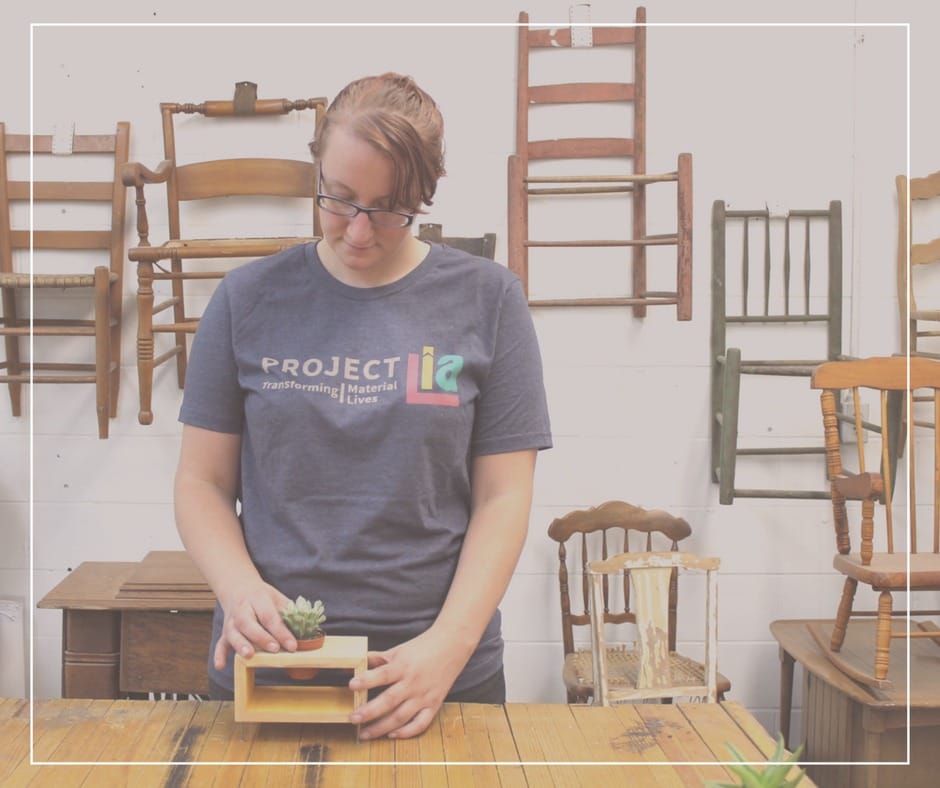 I’d like to share a couple of thoughts. First of all, I think that one of the most important things about studying, observing, practicing and promoting the EoC is the will to collaborate. In order to enter into the relational dynamic of this proposal, it is necessary to open one’s heart, mind and eyes to those small details that make each day something extraordinary: mutual encouragement and a welcoming smile, recognizing the value and the humanity of the other person, the personal encounter with people you never knew before, the ability to wonder, striving for a balance among the different aspects of life, the decision to appreciate every learning opportunity, to assimilate new information, to recognize and support the change that is taking place, to take part in the transformation of obsolete concepts. EoC is an economic proposal that is different from the others, because it is managed by a diverse group of people. It’s not the model in itself, but the people that constitute the center of all the action.
I’d like to share a couple of thoughts. First of all, I think that one of the most important things about studying, observing, practicing and promoting the EoC is the will to collaborate. In order to enter into the relational dynamic of this proposal, it is necessary to open one’s heart, mind and eyes to those small details that make each day something extraordinary: mutual encouragement and a welcoming smile, recognizing the value and the humanity of the other person, the personal encounter with people you never knew before, the ability to wonder, striving for a balance among the different aspects of life, the decision to appreciate every learning opportunity, to assimilate new information, to recognize and support the change that is taking place, to take part in the transformation of obsolete concepts. EoC is an economic proposal that is different from the others, because it is managed by a diverse group of people. It’s not the model in itself, but the people that constitute the center of all the action.  At the conclusion, when I was getting ready to leave I asked myself: How will I describe this experience? The internship was very demanding: the encounter with Project Lia, an innovative business experience, had given me so much. Among other things, working so closely with Elizabeth Wallin, who had begun the project, I saw myself in the future being able to face and overcome challenges and difficult moments. I so much appreciate the time that I had to learn her story: it permitted me to understand business, but also to enter into contact with what is the essence of a business that serves a social purpose. I saw that launching a start-up is quite an enriching process. It’s no secret that doing business is an ongoing Discovery of new things, a real battle. Watching Elizabeth, day after day, I admire her capacity to navigate in a sea of changes. Giving one’s life for a business is an activity that is born from intelligence, but also heart. To launch a project of the EoC society, you need to be able to step out of your comfort zone and encounter the others, just as they are. Patience is needed, humility and flexibility. When this path opens for me too, I’ll be a little closer to what I really am.” Source: Sophia University Institute sophiauniversity.org See also: Project Lia: Transforming Lives
At the conclusion, when I was getting ready to leave I asked myself: How will I describe this experience? The internship was very demanding: the encounter with Project Lia, an innovative business experience, had given me so much. Among other things, working so closely with Elizabeth Wallin, who had begun the project, I saw myself in the future being able to face and overcome challenges and difficult moments. I so much appreciate the time that I had to learn her story: it permitted me to understand business, but also to enter into contact with what is the essence of a business that serves a social purpose. I saw that launching a start-up is quite an enriching process. It’s no secret that doing business is an ongoing Discovery of new things, a real battle. Watching Elizabeth, day after day, I admire her capacity to navigate in a sea of changes. Giving one’s life for a business is an activity that is born from intelligence, but also heart. To launch a project of the EoC society, you need to be able to step out of your comfort zone and encounter the others, just as they are. Patience is needed, humility and flexibility. When this path opens for me too, I’ll be a little closer to what I really am.” Source: Sophia University Institute sophiauniversity.org See also: Project Lia: Transforming Lives
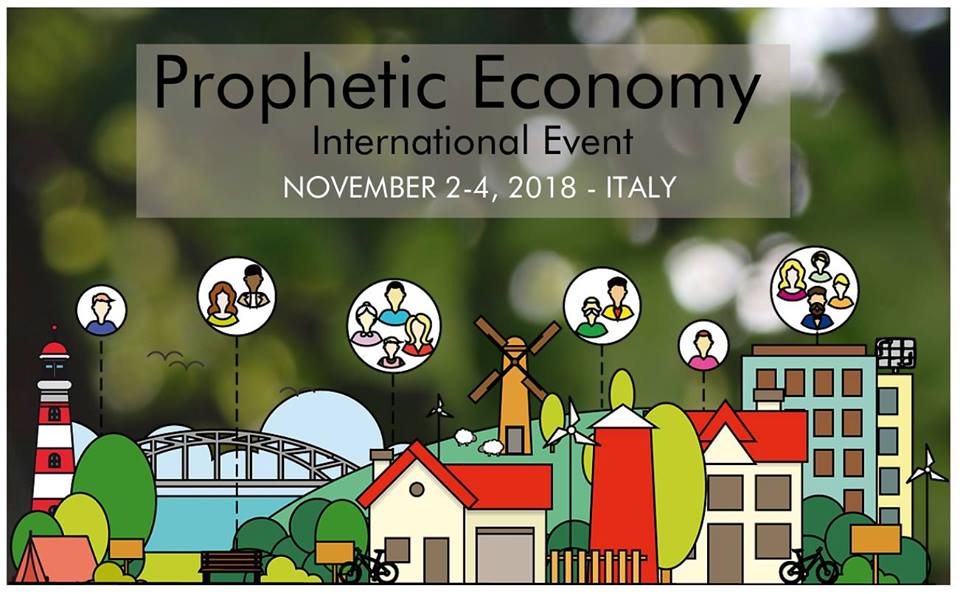
24 Oct 2018 | Focolare Worldwide
 On November 2-4 the International Prophetic Economy event will be held in Castel Gandolfo, Italy. It is being organized by several international movements and institutions whose goal is to create new paths of collaboration among change-makers (individuals as well as private and public organizations) from around the globe. These are change-makers who utilise sustainable solutions for social and environmental problems, work and become engaged in new creative forms of “prophetic” economy that favor the human person, especially the most needy. “Our world,” they claim, “faces an ecological and social crisis. Climate change and growing inequality are nourished by unjust political structures and short-term aid, along with obsolete policies and procedures. Many people around the world believe passionately in human development and in sustainable development that can change the rules and require justice. It’s time to put ourselves together and be more than the sum of our parts. The event was preceded by an award contest, the Prophetic Practices Award 2018, which 135 change-makers held in 35 countries. The experiences of the finalists, chosen by an international jury of experts (Vandana Shiva, Jeff Sachs, Cristina Calvo and Stefano Zamagni), will be presented live during the event in November. See: Prophetic Economy website
On November 2-4 the International Prophetic Economy event will be held in Castel Gandolfo, Italy. It is being organized by several international movements and institutions whose goal is to create new paths of collaboration among change-makers (individuals as well as private and public organizations) from around the globe. These are change-makers who utilise sustainable solutions for social and environmental problems, work and become engaged in new creative forms of “prophetic” economy that favor the human person, especially the most needy. “Our world,” they claim, “faces an ecological and social crisis. Climate change and growing inequality are nourished by unjust political structures and short-term aid, along with obsolete policies and procedures. Many people around the world believe passionately in human development and in sustainable development that can change the rules and require justice. It’s time to put ourselves together and be more than the sum of our parts. The event was preceded by an award contest, the Prophetic Practices Award 2018, which 135 change-makers held in 35 countries. The experiences of the finalists, chosen by an international jury of experts (Vandana Shiva, Jeff Sachs, Cristina Calvo and Stefano Zamagni), will be presented live during the event in November. See: Prophetic Economy website

 In India, in these days is the Festival of Light, the most important celebration of the year: Diwali. It commerates the victorious return of Rama, the manifestation of the Divinity Vishnu, in his capital, Ayodhya, after 14 years of exile and wandering. Therefore, today is a sybolic celebration of the return of the Light to its original home: the victory of good over evil. It is customary to light lamps and candles during the feast, which are traditionally called diya. In many areas of India there are light shows. Project Udisha in Mubai has invited everyone to “light a lamp on the front porch to remind us of the victory of Love, which is in our hearts and which we want to make grwo towards all, beginning with our own family.” See the Facebook page UDISHA PROGETTO MUMBAI INDIA
In India, in these days is the Festival of Light, the most important celebration of the year: Diwali. It commerates the victorious return of Rama, the manifestation of the Divinity Vishnu, in his capital, Ayodhya, after 14 years of exile and wandering. Therefore, today is a sybolic celebration of the return of the Light to its original home: the victory of good over evil. It is customary to light lamps and candles during the feast, which are traditionally called diya. In many areas of India there are light shows. Project Udisha in Mubai has invited everyone to “light a lamp on the front porch to remind us of the victory of Love, which is in our hearts and which we want to make grwo towards all, beginning with our own family.” See the Facebook page UDISHA PROGETTO MUMBAI INDIA

 With one of the fastest growing economies, India is a country which is racing toward constant improvement in life expectancy, literacy rates and health conditions. However, of the 1.2 billion inhabitants of the country, the conditions of those living in the poorest regions are still difficult. Despite its status as an economic power, mortal malnutrition persists. Every evening in India, 200 million people try to fall asleep despite the gnawing hunger. And every day, 3,000 children die of hunger. In Mumbai, where thousands of people go for cancer treatments, Sunny of the Focolare community, wrote: “During the treatments, the families sleep on the road or around the hospital, in the lack of all necessities.” This is an alarming situation of poverty, especially if compared with the data related to the growing waste of perfectly whole foodstuffs, thrown away at the end of wedding banquets, rites, and family parties. The country is one of the world’s main producers of foodstuff, but is likewise one in which a good part of these goods are wasted. Among the causes are also the shortage of transport and warehousing systems especially the “cold chain” system: according to estimates in 2017 of the Indian Ministry of Agriculture, the value of the losses connected to foodstuff wastes (not only in terms of farming goods and foodstuffs, but also in the use of water and energy) could range between 8 and 15 billion dollars yearly.
With one of the fastest growing economies, India is a country which is racing toward constant improvement in life expectancy, literacy rates and health conditions. However, of the 1.2 billion inhabitants of the country, the conditions of those living in the poorest regions are still difficult. Despite its status as an economic power, mortal malnutrition persists. Every evening in India, 200 million people try to fall asleep despite the gnawing hunger. And every day, 3,000 children die of hunger. In Mumbai, where thousands of people go for cancer treatments, Sunny of the Focolare community, wrote: “During the treatments, the families sleep on the road or around the hospital, in the lack of all necessities.” This is an alarming situation of poverty, especially if compared with the data related to the growing waste of perfectly whole foodstuffs, thrown away at the end of wedding banquets, rites, and family parties. The country is one of the world’s main producers of foodstuff, but is likewise one in which a good part of these goods are wasted. Among the causes are also the shortage of transport and warehousing systems especially the “cold chain” system: according to estimates in 2017 of the Indian Ministry of Agriculture, the value of the losses connected to foodstuff wastes (not only in terms of farming goods and foodstuffs, but also in the use of water and energy) could range between 8 and 15 billion dollars yearly. 


 The 40 bishops, who are friends of the Focolari and come
The 40 bishops, who are friends of the Focolari and come 


 I’d like to share a couple of thoughts. First of all, I think that one of the most important things about studying, observing, practicing and promoting the EoC is the will to collaborate. In order to enter into the relational dynamic of this proposal, it is necessary to open one’s heart, mind and eyes to those small details that make each day something extraordinary: mutual encouragement and a welcoming smile, recognizing the value and the humanity of the other person, the personal encounter with people you never knew before, the ability to wonder, striving for a balance among the different aspects of life, the decision to appreciate every learning opportunity, to assimilate new information, to recognize and support the change that is taking place, to take part in the transformation of obsolete concepts. EoC is an economic proposal that is different from the others, because it is managed by a diverse group of people. It’s not the model in itself, but the people that constitute the center of all the action.
I’d like to share a couple of thoughts. First of all, I think that one of the most important things about studying, observing, practicing and promoting the EoC is the will to collaborate. In order to enter into the relational dynamic of this proposal, it is necessary to open one’s heart, mind and eyes to those small details that make each day something extraordinary: mutual encouragement and a welcoming smile, recognizing the value and the humanity of the other person, the personal encounter with people you never knew before, the ability to wonder, striving for a balance among the different aspects of life, the decision to appreciate every learning opportunity, to assimilate new information, to recognize and support the change that is taking place, to take part in the transformation of obsolete concepts. EoC is an economic proposal that is different from the others, because it is managed by a diverse group of people. It’s not the model in itself, but the people that constitute the center of all the action. 